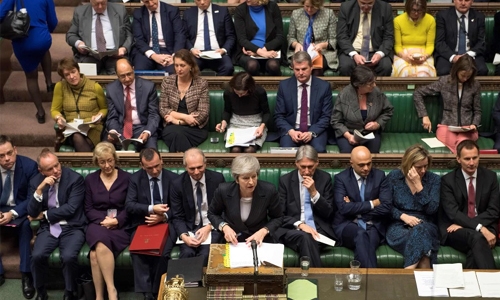UK rejects no-deal Brexit
British MPs signalled their opposition yesterday to leaving the EU with no deal on March 29, in another blow to Prime Minister Theresa May’s authority which opens the door to Britain requesting a Brexit delay. The decision by parliament’s lower House of Commons is largely symbolic as Britain is still on course to leave the EU in just over two weeks unless it can decide a new plan in agreement with Brussels.
Business leaders have warned that Britain is “staring down the precipice” as it faces the possibility of severing 46 years of UK-EU ties overnight, with the risk of an economic shock on both sides of the Channel. And the manner in which MPs voted demonstrated once against the chaos in parliament over Brexit, and the lack of control that May has over events. She had offered MPs a vote on a “no deal” option after they rejected for a second time on Tuesday the divorce terms she negotiated with the EU over many months.
Her proposal made clear that no deal was still the default option, but lawmakers decided instead to back an amendment rejecting “no deal” in all circumstances. Yesterday’s moves open the way for MPs to vote on Thursday on whether to ask the EU for a delay to Brexit -- but Brussels has warned London must explain what it wants. “Why would we prolong the negotiation? To do what?” EU chief negotiator Michel Barnier told the European Parliament in Strasbourg ahead of the vote in London.
May, her voice still hoarse, had warned MPs there were “hard choices” about what would come next. “You can only take no deal off the table by doing one of two things: either revoke Article 50 (the Brexit process), which means betraying the vote of the referendum, or agree a deal,” she said. But her personal failure yesterday, when the rebel “no deal” amendment passed by 312 votes to 308, reveals how much her authority has suffered.
‘Stop this circus’
The pound took a brief knock after MPs rejected May’s divorce deal for a second time on Tuesday, but rallied on hopes that MPs would now vote for a delay. Catherine McGuinness, policy chief for the City of London financial district, said British business was now “staring down the precipice”. Carolyn Fairbairn, director-general of Britain’s biggest employers’ organisation, the CBI, called for parliament to “stop this circus”, saying: “A new approach is needed by all parties.”
The government is expected to propose a “short, limited” postponement on Thursday, but is expecting a slew of amendments that could chart a path forward. “One of the things I think is important, is that we as quickly as we possibly can, find consensus,” Environment Secretary Michael Gove, a leading Brexit supporter in May’s cabinet, told parliament before the vote. A group of Conservative MPs on Wednesday proposed asking the EU to delay Brexit until May 22 and strike a series of interim agreements with the bloc lasting until 2021.
May said this was not realistic, and it was defeated by 374 votes to 164. Finance minister Philip Hammond, who favours a close economic relationship with the EU, earlier seemed to indicate a new plan might be afoot. “We will have the opportunity to start to map out a way forward towards building a consensus across this House for a deal we can collectively support, to exit the EU in an orderly way,” he said.
However, May’s spokesman rejected any suggestion she might back a new customs union with the EU -- Labour’s plan. In Berlin, German Chancellor Angela Merkel said: “Achieving an orderly exit together, and I particularly want to repeat this today, remains in our mutual interest.” French President Emmanuel Macron also warned again that the deal on the table was “not negotiable”.
“We cannot renegotiate an accord that we negotiated over several months and which we have said is not renegotiable,” he said. As Brexit day looms large, Britain and the EU are stepping up preparations for the potential catastrophic disruption caused by a “no deal” divorce. May’s government announced plans to scrap tariffs on 87 percent of imports and stop applying customs checks on the border with Ireland in the event of “no deal”.
Related Posts

